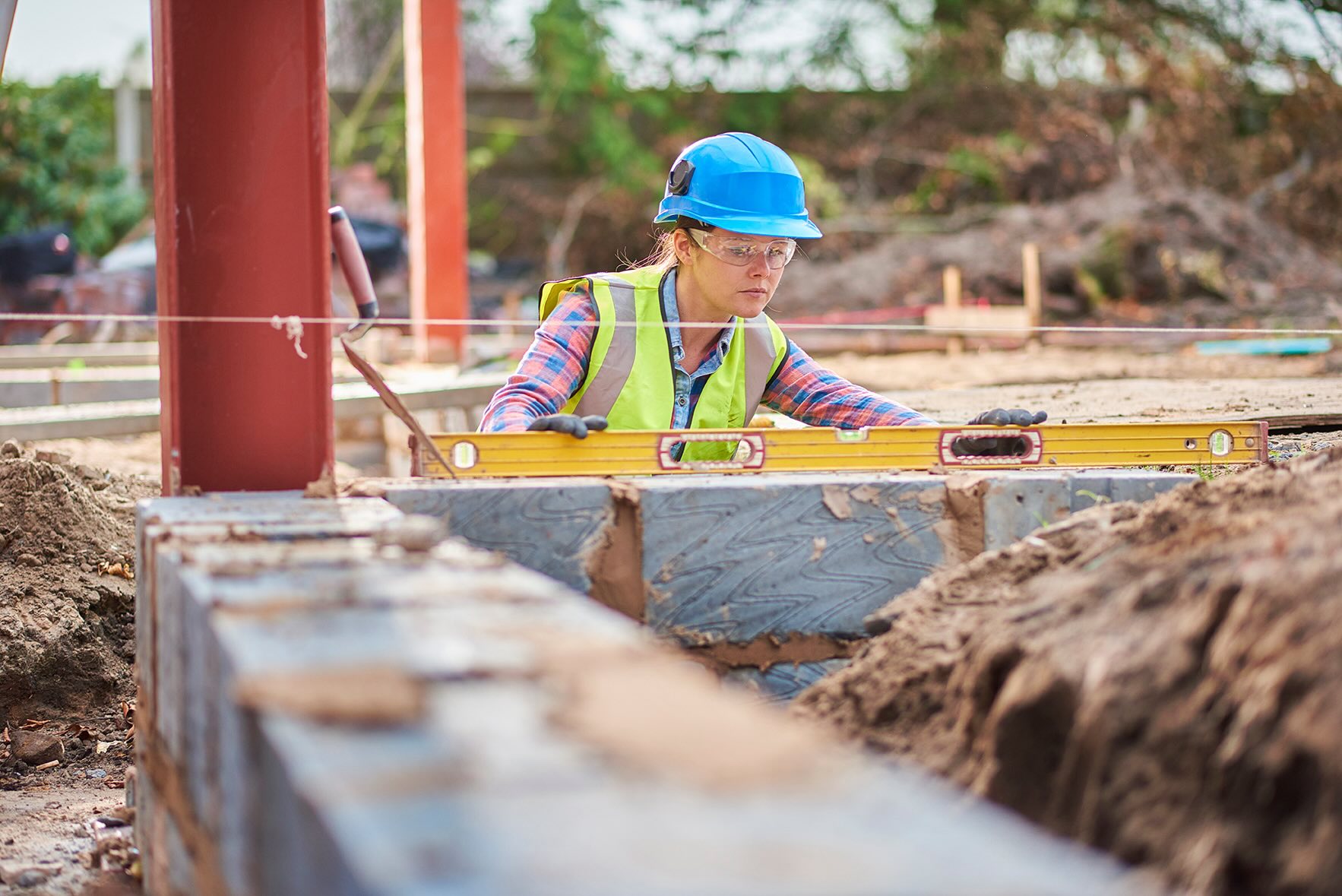Home>diy>Building & Construction>What Education Is Required For Construction


Building & Construction
What Education Is Required For Construction
Modified: January 24, 2024
Discover the educational requirements for pursuing a career in building construction. Find out what qualifications and degrees are necessary to excel in this field.
(Many of the links in this article redirect to a specific reviewed product. Your purchase of these products through affiliate links helps to generate commission for Storables.com, at no extra cost. Learn more)
Introduction
When it comes to the world of construction, education plays a crucial role in building a successful career. Whether you’re interested in becoming a skilled tradesperson or pursuing a career in construction management or engineering, having the right education and training can open doors to various opportunities in the industry.
High-rise buildings, bridges, highways, and infrastructure projects are just a few examples of the remarkable structures that require the expertise of construction professionals. These projects not only require technical knowledge but also demand a deep understanding of safety, design, materials, and project management.
In this article, we will explore the different levels of education that can set you on the path to a successful career in construction. From high school education to vocational training and advanced degrees, each step offers unique learning opportunities to help you develop the skills and knowledge necessary for a rewarding career in the construction industry.
Key Takeaways:
- Education in construction starts with high school, where subjects like mathematics, physics, and vocational courses lay the foundation for further training and development of essential soft skills valued in the industry.
- Vocational training, apprenticeships, and higher education options offer specialized skills, hands-on experience, and comprehensive knowledge, providing diverse pathways for successful careers in construction.
High School Education
A strong foundation in education begins in high school, and this is no exception for those interested in pursuing a career in construction. High school provides students with basic skills and knowledge that serve as a stepping stone for further education and training.
While in high school, students can focus on subjects such as mathematics, physics, and engineering to develop a solid understanding of fundamental principles. These subjects provide a strong theoretical background that can be applied in various construction-related disciplines.
In addition to core academic subjects, high schools often offer vocational courses that introduce students to the world of construction. These courses, which may include woodworking, drafting, or construction technology, provide hands-on experience and an opportunity to develop practical skills.
Furthermore, extracurricular activities such as participating in robotics clubs or joining construction-related organizations can supplement traditional education and offer practical exposure to the field. These activities allow students to work in teams, problem-solve, and gain valuable leadership skills.
Moreover, high school provides an opportunity to develop essential soft skills, including communication, teamwork, and time management. These skills are highly valued in the construction industry, as construction projects often require collaboration among multiple stakeholders and adherence to strict deadlines.
While a high school diploma is the minimum educational requirement for entry-level construction jobs, it is important to recognize that obtaining higher levels of education and training can significantly enhance career prospects.
Next, we will explore vocational training programs and apprenticeships that provide specialized skills and hands-on experience in the construction industry.
Vocational Training
Vocational training programs offer a focused and practical approach to learning construction skills. These programs are designed to provide students with the hands-on training and technical knowledge needed to excel in the construction industry.
One of the advantages of vocational training is that it allows students to specialize in specific trades, such as carpentry, plumbing, electrical work, or masonry. By honing their skills in a specific trade, individuals can become highly skilled and sought-after professionals in their chosen field.
Vocational training programs typically include both classroom instruction and practical application. Students learn about construction fundamentals, safety procedures, blueprint reading, construction materials, and project management. They also have the opportunity to put their knowledge into practice through hands-on projects and simulations.
Many vocational training programs collaborate with local businesses and industry professionals, providing students with real-world exposure and networking opportunities. These partnerships often lead to internships or entry-level positions, allowing students to gain practical experience and establish connections within the industry.
Furthermore, vocational training programs often offer certifications that validate an individual’s skills and knowledge. These certifications, such as the National Center for Construction Education and Research (NCCER) certifications, add credibility to a person’s qualifications and can enhance their employability in the job market.
Vocational training is a viable path for individuals who prefer a hands-on approach and want to enter the construction industry quickly. It not only equips students with practical skills but also instills a work ethic and problem-solving mindset that are essential in construction professions.
However, it’s important to note that while vocational training can open doors to entry-level positions, further education and experience often contribute to career growth and advancement. Apprenticeships and higher education options provide individuals with the opportunity to excel in their chosen construction field.
Next, we will explore apprenticeships and how they can further enhance one’s skills and knowledge in the construction industry.
Apprenticeships
Apprenticeships are a time-honored tradition in the construction industry and offer a unique and valuable learning experience. Apprenticeships combine hands-on training with classroom instruction, providing individuals with the opportunity to learn from experienced professionals in their chosen trade.
One of the key benefits of apprenticeships is the practical, on-the-job training they provide. Apprentices work alongside skilled tradespeople, gaining firsthand experience and developing their skills in real-world construction projects. This hands-on approach allows apprentices to learn the intricacies of their trade, understand best practices, and master the use of tools and equipment.
Apprenticeships also provide individuals with the chance to earn a wage while they learn. Unlike traditional educational programs, apprenticeships offer a “earn as you learn” model, enabling participants to support themselves financially throughout the training period.
Furthermore, apprenticeships typically include structured classroom instruction. Apprentices attend technical training classes where they learn about safety procedures, trade-specific theory, construction codes and regulations, and project management. This combination of practical experience and theoretical knowledge ensures a well-rounded education that prepares apprentices for a successful career in construction.
Apprenticeships can vary in duration, typically ranging from one to five years, depending on the trade and program. During this time, apprentices progress through different levels of skill and responsibility, under the guidance and supervision of experienced mentors.
Upon successful completion of an apprenticeship, individuals receive a nationally recognized certification or journeyman status, depending on the trade. This certification validates their skills and serves as a stepping stone to higher-level positions within the construction industry.
Apprenticeships are highly regarded in the construction industry, as they provide a well-rounded and comprehensive education. They also offer networking opportunities and potential employment with the company or organization that provided the apprenticeship.
While apprenticeships are an excellent option for those who prefer a hands-on learning approach, they are not the only educational path available. In the next sections, we will explore options for individuals who wish to pursue higher education in construction management or engineering.
Tip: Most construction jobs require a high school diploma or equivalent, but specialized roles may require a trade school certificate or a bachelor’s degree in construction management or a related field. Research the specific requirements for your desired role.
Associate’s Degree in Construction Management
An Associate’s degree in Construction Management is a two-year program that provides a comprehensive understanding of the construction industry, focusing on project management and leadership skills. It is an excellent choice for individuals who wish to pursue a career in construction management or advance their existing construction careers.
The curriculum of an Associate’s degree program in Construction Management covers a range of subjects, including construction planning, cost estimation, scheduling, construction law, and safety regulations. Students also learn about construction materials, building codes, and sustainable construction practices.
One of the significant advantages of pursuing an Associate’s degree in Construction Management is the emphasis on managerial and communication skills. Students learn how to effectively communicate with team members, clients, and stakeholders, ensuring smooth coordination and successful project delivery.
Additionally, construction management programs often incorporate coursework on business principles, such as accounting, finance, and project budgeting. Acquiring a foundational knowledge of business allows construction managers to make informed decisions related to financial planning and resource allocation.
While classroom instruction is a vital component of the program, many Associate’s degrees in Construction Management also incorporate practical experience through internships or cooperative education opportunities. These hands-on experiences provide students with real-world exposure to construction projects and allow them to apply the knowledge gained in the classroom.
Upon completion of an Associate’s degree, graduates are well-prepared for entry-level positions in construction management, such as project coordinator, estimator, or field supervisor. They possess the necessary skills to oversee project planning, scheduling, and budgeting, and can effectively collaborate with contractors, subcontractors, and clients.
An Associate’s degree in Construction Management can also serve as a solid foundation for further education. Many graduates choose to pursue a Bachelor’s degree in Construction Management or related fields to expand their career opportunities and increase their potential for advancement in the industry.
Overall, an Associate’s degree in Construction Management provides individuals with a balanced blend of technical knowledge, management skills, and practical experience. It equips them with the skills required to excel in the construction industry and lays the groundwork for a successful career in construction management.
Read more: What Education Do Construction Painters Have
Bachelor’s Degree in Construction Engineering
A Bachelor’s degree in Construction Engineering is a four-year program that combines engineering principles with construction management. This degree is ideal for individuals who are interested in becoming construction engineers and overseeing the technical aspects of construction projects.
The curriculum of a Bachelor’s degree program in Construction Engineering covers a wide range of subjects, including structural analysis, materials science, geotechnical engineering, construction methods, and project management. Students gain a deep understanding of the technical aspects of construction, ensuring the safety, durability, and efficiency of built structures.
In addition to engineering coursework, students also learn about project planning, cost estimation, scheduling, and construction contracts. This comprehensive education equips construction engineers with a holistic understanding of the construction process, from the initial design stages to project completion.
Hands-on experience is an integral part of a Bachelor’s degree in Construction Engineering. Students often participate in laboratory experiments and fieldwork, where they apply engineering principles to real-world construction challenges. They also have opportunities for internships or co-op programs, allowing them to gain practical experience and work alongside industry professionals.
One of the key advantages of a Bachelor’s degree in Construction Engineering is that it prepares graduates for licensure as professional engineers. After completing the degree and gaining practical experience, individuals can sit for the engineering licensure exam, which grants them the authority to take on responsibilities that require professional engineering expertise.
Career opportunities for construction engineers are vast and varied. Graduates can work for construction firms, engineering consulting firms, government agencies, or architectural firms. They may be involved in the design, construction, or management of projects, ensuring that they meet engineering standards and regulations.
Furthermore, a Bachelor’s degree in Construction Engineering can be a stepping stone to advanced education. Many graduates choose to pursue Master’s degrees in Construction Engineering, Civil Engineering, or related fields to gain specialized knowledge and further enhance their career prospects.
In summary, a Bachelor’s degree in Construction Engineering provides individuals with a strong foundation in both engineering principles and construction management. This comprehensive education equips graduates with the technical skills, analytical thinking, and leadership abilities necessary to excel as construction engineers and make significant contributions to the industry.
Conclusion
Education plays a crucial role in building a successful career in the construction industry. Whether you choose the path of vocational training, apprenticeships, or higher education, each option offers unique opportunities to develop the skills and knowledge necessary for a thriving career in construction.
High school education provides a solid foundation, allowing students to develop essential skills and a theoretical understanding of construction principles. Vocational training programs offer specialized skills and hands-on experience, enabling individuals to become skilled professionals in specific trades.
Apprenticeships provide a valuable learning experience, combining practical on-the-job training with structured classroom instruction. Apprentices have the opportunity to work alongside experienced professionals, gaining firsthand experience and earning certifications that validate their skills.
For those interested in construction management, obtaining an Associate’s degree provides a comprehensive understanding of project management, cost estimation, and construction process. It equips individuals with the managerial and communication skills necessary for successful coordination and leadership in the industry.
On the other hand, a Bachelor’s degree in Construction Engineering combines engineering principles with construction management, preparing graduates for technical roles in the industry. It provides in-depth knowledge of structural analysis, materials science, and project planning, allowing construction engineers to ensure the safety and efficiency of construction projects.
Ultimately, the education path you choose in the construction industry depends on your interests, goals, and desired career trajectory. It’s important to continuously seek opportunities for growth and improvement, whether through additional certifications or advanced degrees.
By obtaining the right education and training, you can open doors to various career opportunities in the construction industry and position yourself for success. Whether you’re involved in the hands-on aspects of construction or overseeing the technical and managerial aspects, your education will serve as a foundation for a rewarding and fulfilling career in construction.
Remember, education is just the beginning. Continuously honing your skills, staying updated with industry advancements, and gaining practical experience are equally important in achieving long-term success in the dynamic and ever-evolving world of construction.
Frequently Asked Questions about What Education Is Required For Construction
Was this page helpful?
At Storables.com, we guarantee accurate and reliable information. Our content, validated by Expert Board Contributors, is crafted following stringent Editorial Policies. We're committed to providing you with well-researched, expert-backed insights for all your informational needs.















0 thoughts on “What Education Is Required For Construction”